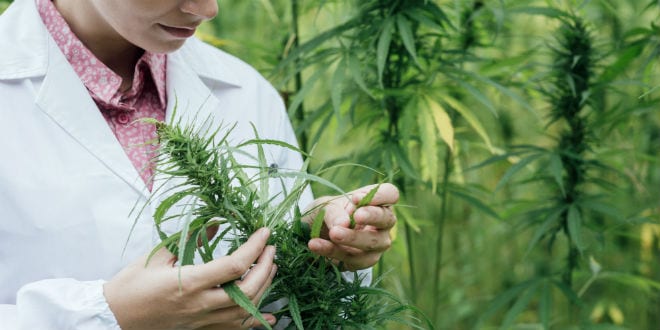The use of medical cannabis (marijuana) has been permitted for years in numerous countries, including Israel. In recent years, the use of medical cannabis to treat sick children has been on the rise, but questions remain about the benefits and safety of such treatments.
Children aren’t small adults, and medical cannabis affects youngsters differently, so doctors must pay close attention to those differences. On the plus side, medical cannabis proved very helpful for children undergoing chemotherapy, reducing the severity of nausea and vomiting which often accompanies this treatment,
Now, a team of researchers from the Hebrew University of Jerusalem (HUJI) has completed a first-ever meta-analysis (a statistical analysis that combines the results of multiple scientific studies) of pediatric patients treated with medical cannabis to understand better the risks and benefits of cannabis use among young patients.
The meta-review was led by Prof. Ilan Matok at HUJI’s School of Pharmacy and the Bloom Center for Pharmacy, along with and doctoral candidate Nir Treves. They will present their findings at the 31st Annual International Cannabinoid Research Society Symposium (ICRS) being held in Jerusalem this week, for the first time ever. The conference host is HUJI’s Multidisciplinary Center for Cannabinoid Research, a leading research center on cannabinoids, endocannabinoids, and medicinal cannabis.
The team looked at seven clinical studies involving some 500 young patients under 18 years of age. Despite the limited number of participants, they were able to glean both positive and negative effects of medical cannabis use on kids’ mental and physical health. For example, the team found that CBD (cannabidiol) is effective at decreasing the number of severe seizures in children, especially those with hard-to-treat epilepsy.
Cannabidiol is the second-most-prevalent of the active ingredients of cannabis. While CBD is an essential component of medical marijuana, it is derived directly from the hemp plant, which is a cousin of the marijuana plant. While CBD is one of the hundreds of components of marijuana, it by itself does not cause a “high.”
One problem is that while benefiting such children, CBD also greatly suppresses their appetites. They also found that several cannabis plant ingredients used in medical treatments adversely affect children’s mental state, causing fatigue, apathy, dizziness, and lethargy.
The study of medical cannabis in children is still in its infancy. Since cannabis is not registered as a medication, it is often prescribed to children on as-needed basis with limited clinical evidence. “Whereas Pfizer and Moderna were able to conduct clinical trials for their COVID-19 vaccine on kids, few high-level clinical trials exist for cannabis use in children. “The goal of our meta-analysis is to shed light on this area and provide doctors and parents with a more informed view of the potential of cannabis to help or harm their young patients,” Matok stressed.
Matok’s next research project is to study the effectד of medical marijuana on young patients, looking specifically at whether it raises their rates of depression, cardiovascular incidents, and involvement in car accidents.
Meanwhile, in foreign studies at least so far, the currently limited research base does not establish that cannabis has additional adverse effects on brain development or functioning in adolescents or young adults with attention-deficit/hyperactivity disorder (ADHD), according to a review in the July/August issue of Harvard Review of Psychiatry.
While ADHD is clinically defined to have impairments in cognitive functioning, cannabis use by itself is also associated with cognitive impairments: “The evidence to date does not clearly support either an addictive effect or an interaction – whether protective or harmful – with cannabis use,” according to the study by Dr. Philip Cawkwell of Stanford University School of Medicine and colleagues. They underscore the need for further research to clarify possible effects of cannabis on brain structure, function, and behavior in young people with ADHD.
The trends toward legalization and increased accessibility and potency of cannabis pose special concerns in young people living with ADHD. About one-fourth of teens with substance use disorder also have ADHD, while youth with ADHD are six times more likely to have drug or alcohol abuse, the researchers said. Some people with ADHD may even feel that cannabis improves their symptoms. Both groups have similar difficulties on cognitive tests, suggesting that youth with ADHD might be particularly vulnerable to the effects of cannabis on cognitive function.
Seven studies assessed neuroimaging findings for young ADHD patients and showed some significant differences in brain structure in cannabis users. Findings included decreased thickness in areas involved with motor and sensory function and increased thickness in areas involved in the brain’s “reward: system. Given the limitations of the studies, the authors stress that these findings must be considered with caution and that it was impossible to determine whether or not these findings reflect causal relationships.
Four studies looked at the results of neuropsychological tests or questionnaires in young people with ADHD who did and did not use cannabis. Cannabis use was associated with impaired performance on tests of sustained attention, but the studies found no significant interaction between ADHD and cannabis use.
The authors noted that the key limitation to this research is both the number of studies and the overall number of participants are limited. Some studies suggested differences in the effects of cannabis use at earlier ages – a critical gap for further research. Additional factors the authors suggest need further examination include the potency of cannabis (which has roughly tripled in the past two decades, according to prior research) and the frequency of use.
The shortcode is missing a valid Donation Form ID attribute.



